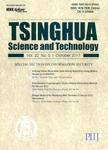Reactive Extraction of Alcohols from Apolar Hydrocarbons with Aqueous Solutions
Reactive Extraction of Alcohols from Apolar Hydrocarbons with Aqueous Solutions作者机构:Akzo Nobel Chemicals Research Arnhem The Netherlands University of Twente Enschede The Netherlands DSM Research Geleen The Netherlands
出 版 物:《Tsinghua Science and Technology》 (清华大学学报(自然科学版(英文版))
年 卷 期:2006年第11卷第2期
页 面:222-227页
核心收录:
学科分类:081704[工学-应用化学] 07[理学] 08[工学] 0817[工学-化学工程与技术] 070302[理学-分析化学] 0703[理学-化学]
基 金:Supported by DSM NWO-CW (Netherlands Organisation for Scien-tific Research-Chemical Science) and NOVEM (Netherlands Agency for Energy and Environment)
主 题:reactive extraction alcohol polar hydrocarbons
摘 要:The aqueous solutions are evaluated as sustainable reactive extraction solvents for the recovery of monohydroxyl alcohols (benzyl alcohol, 1-hexanol, cyclohexanol) present in few-percent concentrations in apolar hydrocarbons (toluene, n-hexane, and cyclohexane) by considering two approaches. An aqueous solution containing a reactive extractant, like borate salts, borate complexes, a monosalt of dicarboxylic acid, hydroxypropyl-cyclodextrins, and silver nitrate, shows limited potential to be used. Another approach, in which the alcohol is chemically modified prior to the extraction into an easy-extractable form, in this case a monoester/carboxylic acid, shows much more potential. An environmentally benign aqueous solution of sodium hydrogen carbonate can provide a distribution ratio of benzyl alcohol up to 200, leaving the solubility of the organic solvent in the aqueous solution unchanged relative to pure water and therefore increasing the selectivity with two orders of magnitude. The modification of aromatic, cyclo-aliphatic, and linear aliphatic alcohols can be performed efficiently in the apolar organic solvent without need for a catalyst. The recovery of the modified alcohol can be performed by back-extraction in combination with a spontaneous hydrolysis.



